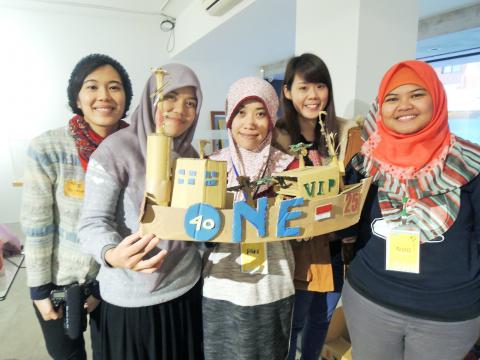For Southeast Asian workers, free business-management classes, help with everyday life and monthly social events to mingle with young Taiwanese are among the services provided by the One-Forty Foundation.
Created by Chen Kai-hsiang (陳凱翔) and Wu Chih-ning (吳致寧), two business management professionals in their late 20s, the One-Forty Foundation was organized to cater to guest workers’ needs for education beyond basic language ability and cultural awareness.
Chen said that after he graduated from National Chengchi University’s business school, he began working in a consultant company, while volunteering to teach Chinese for the Taiwan International Workers’ Association.

Photo: Yeh Kuan-yu, Taipei Times
He discovered that migrants have needs in addition to the language and cultural classes offered by most outreach programs, so he created the One-Forty Foundation with his friend, Wu.
The foundation’s name refers to one person in every 40 in Taiwan being a Southeast Asian guest worker, with a total of about 600,000 in the nation, Chen said.
The “guest workers’ business school” created by the foundation in July last year is an example of a unique social service that it provides for migrants, he added.
It provides migrants with free education in finance, management and marketing, and the classes are tailored for migrants who plan to open a small business when they return home with money they have earned in Taiwan, which is a common aspiration of guest workers, Chen said.
Classes are taught during weekends and holidays, with eight courses taught over a three-month period, and the foundation this year began uploading lectures online to make materials available to foreign workers who are unable to attend classes during holidays.
To help migrants who are not fluent in both English and Chinese, the foundation organizes teams of guest workers to translate instructions displayed by railway ticket vending machines into their native language and distribute the translations to other expats, which serves as language-skills practice and is a confidence-building exercise for the participants, Chen said.
The foundation also holds monthly outreach events, including picnics in public venues, such as Daan Forest Park (大安森林公園), the 228 Memorial Park or Taipei Railway Station — called “Southeast Asian Sundays” — which are attended by guest workers and young Taiwanese.
Lina, from Indonesia, said that prior to attending Southeast Asian Sunday events, she often felt young Taiwanese she met in Taipei were unfriendly toward her.
Another Indonesian expat, Yusni, who has been working in Taiwan for six years, said that the social events allowed her to make friends with young Taiwanese outside the Indonesian guest workers’ social circle, and that she now has Taiwanese friends to dine and travel with.
One foreign worker said the foundation previously invited internationally renowned artists Isabel Gaudinez-Aquilizan and Alfredo Juan Aquilizan, a husband-and-wife team, to help guest workers get involved with artistic projects.
Chen said that the focus of the outreach program is to encourage interaction between Taiwanese and guest workers.
“Taiwanese are paying closer attention to guest workers, but people still tend to see them as a minority group that needs help. In reality, they are just like us,” Chen added.

Taipei, New Taipei City, Keelung and Taoyuan would issue a decision at 8pm on whether to cancel work and school tomorrow due to forecasted heavy rain, Keelung Mayor Hsieh Kuo-liang (謝國樑) said today. Hsieh told reporters that absent some pressing reason, the four northern cities would announce the decision jointly at 8pm. Keelung is expected to receive between 300mm and 490mm of rain in the period from 2pm today through 2pm tomorrow, Central Weather Administration data showed. Keelung City Government regulations stipulate that school and work can be canceled if rain totals in mountainous or low-elevation areas are forecast to exceed 350mm in

EVA Airways president Sun Chia-ming (孫嘉明) and other senior executives yesterday bowed in apology over the death of a flight attendant, saying the company has begun improving its health-reporting, review and work coordination mechanisms. “We promise to handle this matter with the utmost responsibility to ensure safer and healthier working conditions for all EVA Air employees,” Sun said. The flight attendant, a woman surnamed Sun (孫), died on Friday last week of undisclosed causes shortly after returning from a work assignment in Milan, Italy, the airline said. Chinese-language media reported that the woman fell ill working on a Taipei-to-Milan flight on Sept. 22

COUNTERMEASURE: Taiwan was to implement controls for 47 tech products bound for South Africa after the latter downgraded and renamed Taipei’s ‘de facto’ offices The Ministry of Foreign Affairs is still reviewing a new agreement proposed by the South African government last month to regulate the status of reciprocal representative offices, Minister of Foreign Affairs Lin Chia-lung (林佳龍) said yesterday. Asked about the latest developments in a year-long controversy over Taiwan’s de facto representative office in South Africa, Lin during a legislative session said that the ministry was consulting with legal experts on the proposed new agreement. While the new proposal offers Taiwan greater flexibility, the ministry does not find it acceptable, Lin said without elaborating. The ministry is still open to resuming retaliatory measures against South

1.4nm WAFERS: While TSMC is gearing up to expand its overseas production, it would also continue to invest in Taiwan, company chairman and CEO C.C. Wei said Taiwan Semiconductor Manufacturing Co (TSMC) has applied for permission to construct a new plant in the Central Taiwan Science Park (中部科學園區), which it would use for the production of new high-speed wafers, the National Science and Technology Council said yesterday. The council, which supervises three major science parks in Taiwan, confirmed that the Central Taiwan Science Park Bureau had received an application on Friday from TSMC, the world’s largest contract chipmaker, to commence work on the new A14 fab. A14 technology, a 1.4 nanometer (nm) process, is designed to drive artificial intelligence transformation by enabling faster computing and greater power